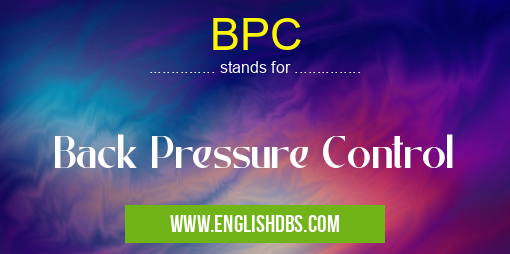What does BPC mean in
BPC stands for Back Pressure Control. It is a technique used in engineering to regulate the pressure in a fluid system by adjusting the flow rate. BPC ensures that the pressure downstream of a valve or pump remains within acceptable limits.

BPC meaning in in Miscellaneous
BPC mostly used in an acronym in Category Miscellaneous that means Back Pressure Control
Shorthand: BPC,
Full Form: Back Pressure Control
For more information of "Back Pressure Control", see the section below.
» Miscellaneous »
Types of BPC Systems
There are various types of BPC systems, including:
- Valve-based: Utilizes valves to control the flow rate and maintain desired pressure.
- Pump-based: Employs pumps to adjust the flow rate and regulate pressure.
- Combination: Combines valves and pumps to achieve optimal pressure control.
Application of BPC
BPC systems are extensively used in various industries, such as:
- Oil and gas: Regulating pressure in pipelines and production facilities.
- Power generation: Controlling pressure in boilers and turbines.
- Automotive: Maintaining pressure in braking systems.
- Pharmaceuticals: Ensuring proper pressure in manufacturing processes.
Benefits of BPC
- Improved efficiency: Optimizing pressure levels reduces energy consumption and improves system performance.
- Reduced maintenance: Stable pressure conditions minimize wear and tear on system components, leading to reduced maintenance costs.
- Enhanced safety: Properly controlled pressure prevents accidents and ensures safe operation.
- Extended system life: Balanced pressure conditions prolong the lifespan of valves, pumps, and other system components.
Essential Questions and Answers on Back Pressure Control in "MISCELLANEOUS»AUTOMOTIVE"
What is Back Pressure Control (BPC)?
BPC is a technique used in manufacturing and engineering to regulate the pressure within a system to maintain optimal performance and prevent damage to equipment.
How does BPC work?
BPC involves installing a device, such as a valve or regulator, in a system to control the pressure. The device monitors the pressure and adjusts it to a predetermined setpoint by manipulating the flow of fluid or gas.
What are the benefits of BPC?
BPC provides several benefits, including:
- Improved system efficiency and performance
- Reduced energy consumption
- Prevention of equipment damage and premature failure
- Increased safety and reliability
Where is BPC used?
BPC finds applications in various industries, such as:
- Fluid power systems
- Hydraulic systems
- Pneumatic systems
- Power plants
- Chemical processing plants
How is BPC implemented?
Implementing BPC requires a thorough understanding of the system and its operating parameters. The process typically involves:
- Analyzing the system's pressure requirements
- Selecting and installing an appropriate BPC device
- Configuring and setting the device to the desired pressure setpoint
- Monitoring and adjusting the system as needed
Final Words: BPC (Back Pressure Control) is a crucial engineering technique that plays a vital role in regulating pressure in fluid systems. By controlling the flow rate, BPC ensures optimal performance, efficiency, and safety in various industrial applications.
BPC also stands for: |
|
| All stands for BPC |
